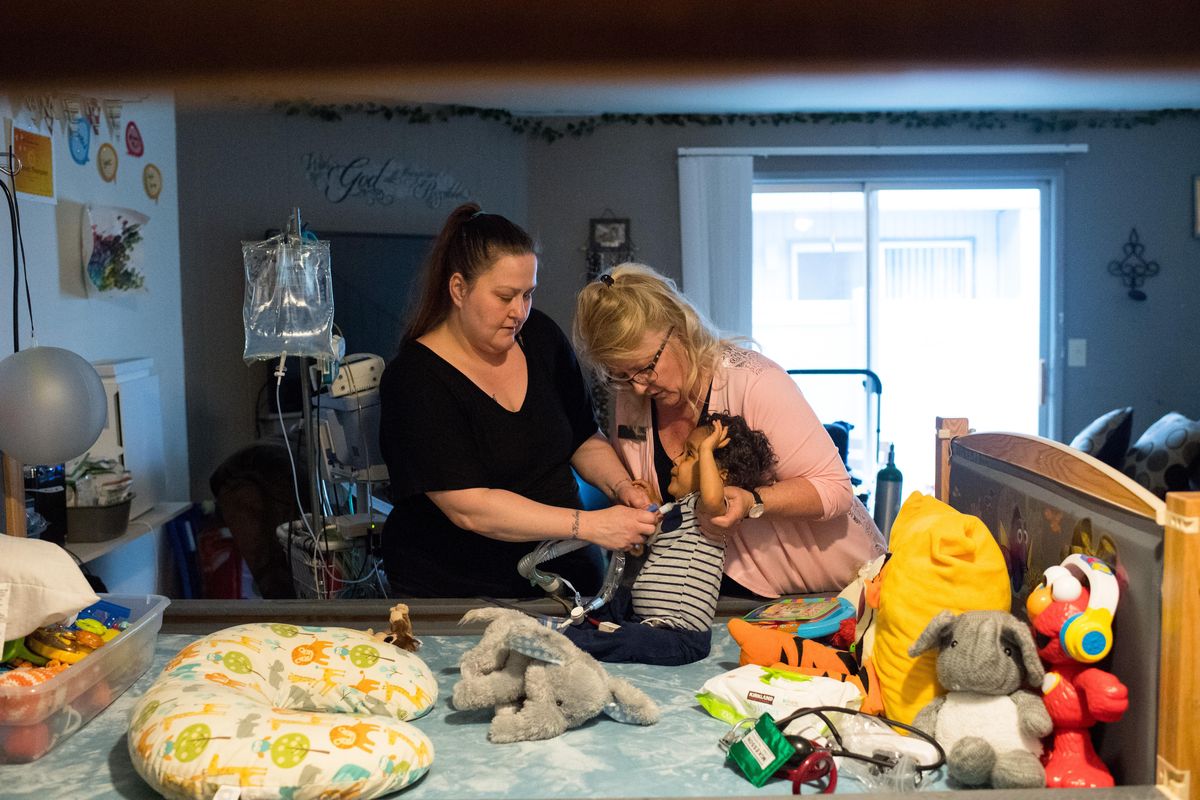Renae Wedlake wanted to provide infusion nursing care on her own terms. With All Heart Infusion, she’s doing it her way.

After 39 years in nursing, the last 20 years as a home infusion nurse, Renae Wedlake was tired of being told she needed to spend less time with her patients and to focus solely on the task, not the person she was treating.
“When I started in nursing my goal was to care about people. I care for each patient as I would for a family member,” she said. “But I was being asked to see more and more patients in less and less time.”
Two years ago, she reached a turning point. The company she was working for was closing, so she decided to launch her own business. All Heart Infusion was formed in September 2017, and received nonprofit status June 2018.
Currently, Wedlake and her team of three nurses care for 48 patients throughout Eastern Washington and North Idaho.
Infusion nurses work specifically with intravenous care. They assist patients who have ports or central lines and need regular treatment of IV medications.
Treatments can range from antibiotics, to iron infusions, to monitoring patients with nutrition issues and feeding tubes.
While some insurers cover the cost of home infusion care, not all do. That’s why the pillar of All Heart Infusion is their Charity Care program.
“In 2018, we provided over $120,000 in free care,” Wedlake said.
Grants and fundraisers help cover the costs.
Of All Heart Infusion’s 48 patients, 11 are children. One of them is 2 year-old Trammell Armstrong.
Wedlake visits Trammell and his mom, Trisha Thompson every two weeks to do blood draws and administer medication to boost his compromised immune system.

Last week, Wedlake cuddled Trammell on her lap, while Thompson told her son’s amazing story of survival.
Trammell was born at 26 weeks gestation and weighed 1 pount, 1 ounce.
“He was the smallest thing I’ve ever seen in my life,” Thompson said. “He was the size of a Bic pen.”
A host of health issues kept Trammell in the hospital for the first 16 months of his life.
“Five hundred and nine days,” said Thompson. “Five surgeries, 27 blood transfusions, and he’s been resuscitated more times than I can count.”
Her eyes filled.
“But something inside of me said that Trammell wants to be here. I’ve always felt like he was meant to be here. A lot of people are given life – he fought for it.”
Beads of Courage hang from a wall in their apartment. Thompson was given the beads during Trammell’s lengthy hospital stay. Each time he underwent a procedure, she’d thread a bead on a strand.
She can’t count how many beads she’s strung. She draped them over her arm.
“They weigh five pounds,” she said.
When he was finally allowed to come home, Thompson had to manage his tracheotomy tube, his feeding tube and his ventilator.
“This is scary,” she said, gesturing to the equipment that surrounds her smiling son.
After struggling to work with other home infusion providers, Thompson was referred to All Heart eight months ago.
“The vibe was so calm the minute she walked in,” Thompson said of Wedlake. “I deal with a lot of medical people and they’re not always kind, but Renae’s become not just my nurse, but my counselor. I can call her any time. It means the world to me.”
Wedlake said she and her nurses believe chronic illness affects the whole family, not just the patient.
She bounced Trammell on her knee.
“This is a valuable life right here,” she said. “He grabbed a piece of my heart I knew we’d have a connection and I’d be able to help him.”
And Trammell is thriving.
The risk of infection is huge and can be deadly in patients with ports, but Trammell hasn’t been hospitalized since he came home a year ago.
“He’s doing great,” Thompson said. “My son is walking now, and I was told he never would.”
Wedlake said she sees improvement with every visit, and it drives home the reason she started All Heart Infusion.
“It’s very rewarding to be able to take care of the whole person. There’s so much more to a person than their illness,” she said.
She ran her fingers through Trammell’s curls.
“He’s not a diagnosis. He’s a living human being who deserves all the best.”